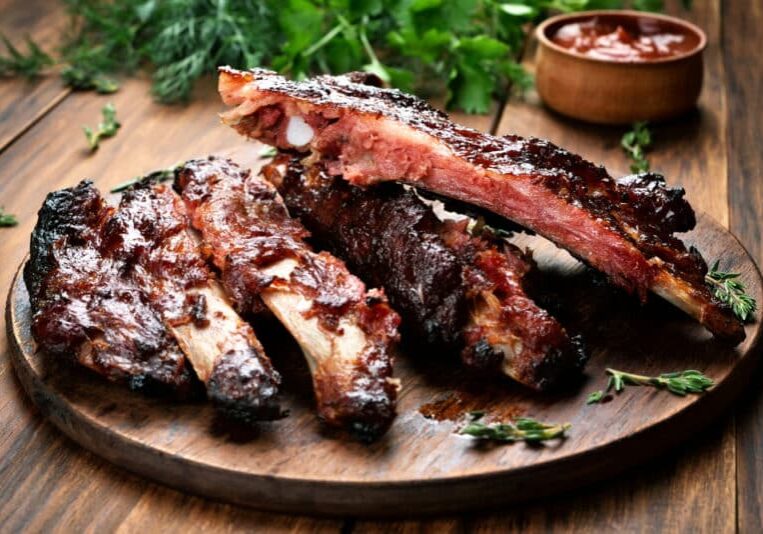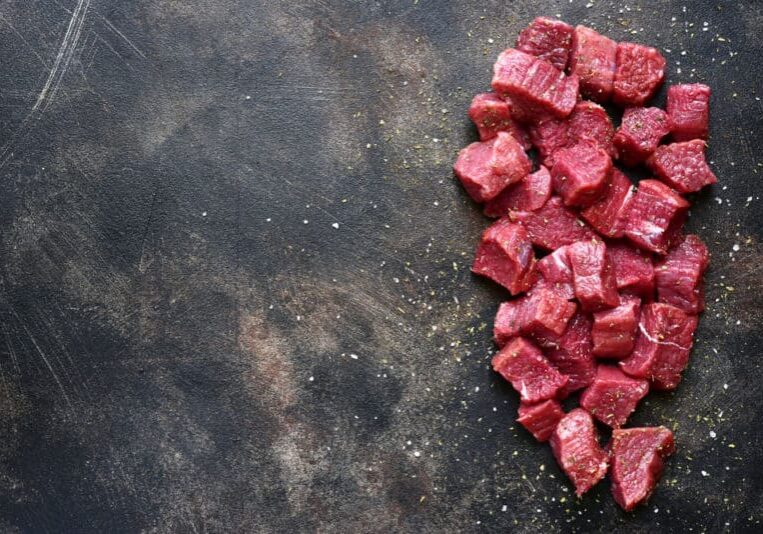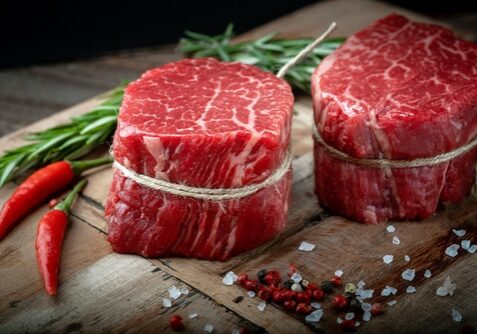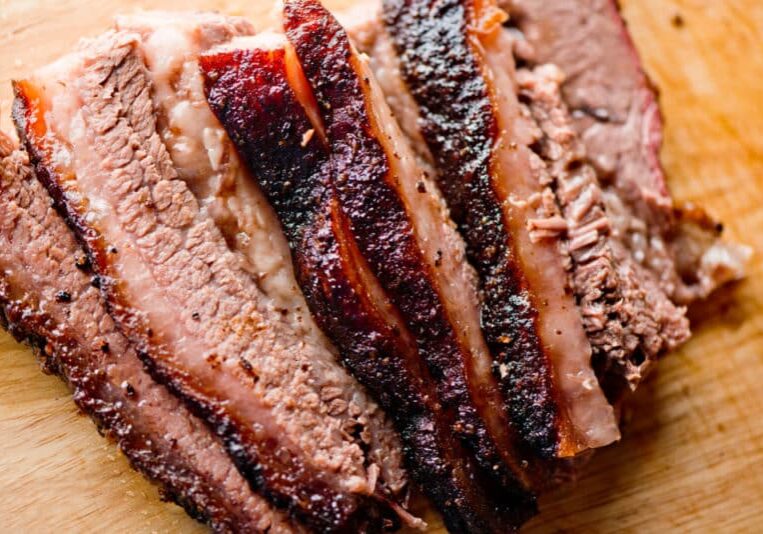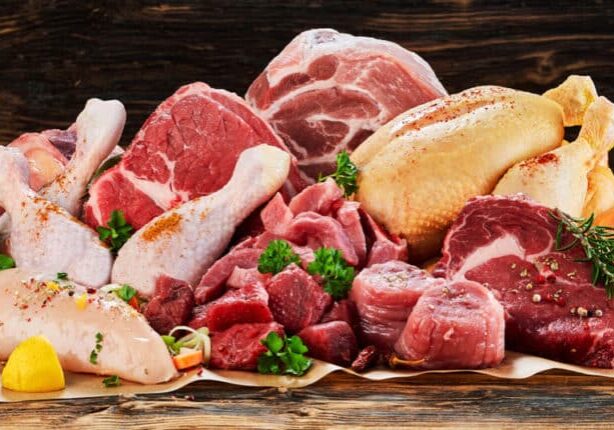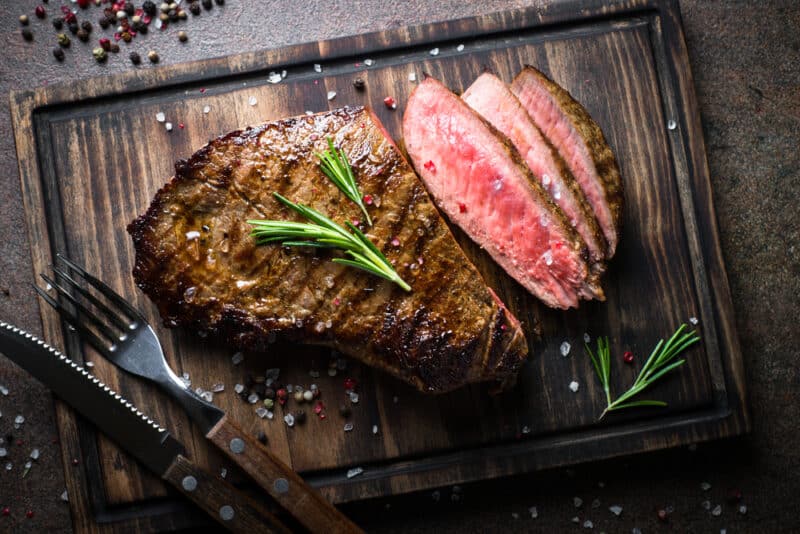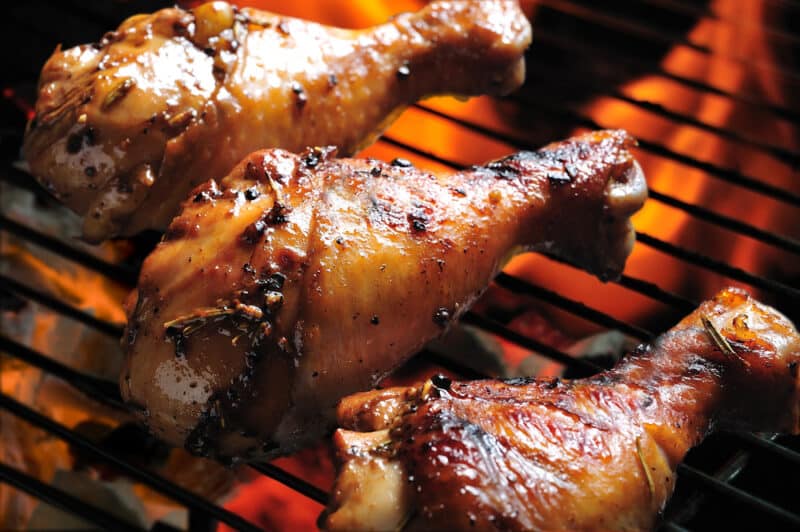Grass-fed Vs. Grain-fed Brisket: What’s Best For Grilling?
TheGrillingMaster.com is reader-supported. If you buy something using the links on our site, we might earn an affiliate commission at no added cost to you. This helps us pay our staff to keep making awesome content for you!
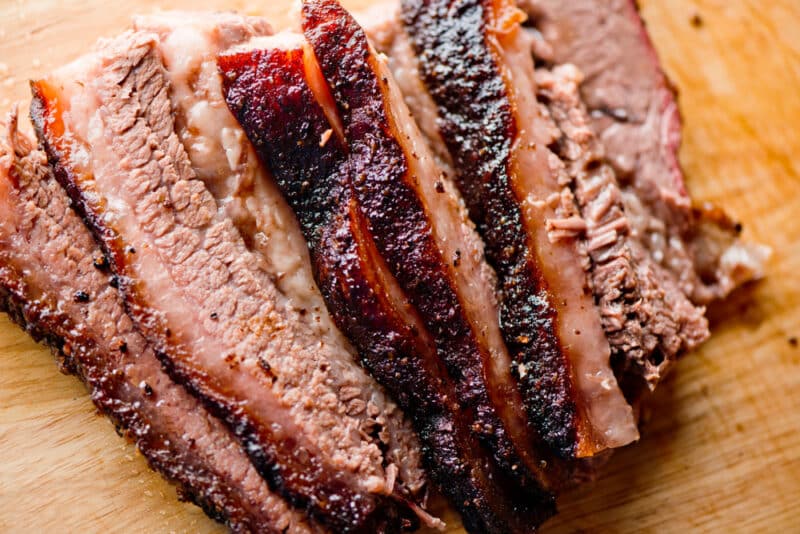
Summer barbecues are a cherished ritual, and let’s be honest, the hero of any great cookout is often a perfectly cooked brisket. But when faced with the choice between grass-fed or grain-fed, even seasoned grill enthusiasts can feel a flicker of doubt.
It’s not just about choosing sides in the great taste debate; this decision really does lay down the flavor foundation for your feast.
We all know that feeling – standing there at the butcher shop, hemming and hawing over which cut will make our grilling legendary. It’s almost like picking your team on game day! And did you consider that grass-fed beef isn’t only about leaning into a trend? It’s about cattle munching on greens they’d naturally graze on out in pastures.
Fear not! We’ve put our aprons on and done some digging to help guide you through these choices with finesse. From unraveling nutrition facts to dissecting flavor nuances – we’ve got your back so you can grill with confidence and maybe even impress Aunt Marge who claims she’s had “the best brisket of her life” too many times to count.
So fire up those coals (or light up that gas), because armed with this knowledge, you’re set to be more than just another person behind a barbecue—you’re going to be that sought-after maestro of meat every summer gathering deserves!
Key Takeaways
- Grass-fed beef is leaner and boasts a more favorable nutritional profile with lower total and saturated fats, higher levels of omega-3 fatty acids, CLA, vitamins A & E, and antioxidants.
- Grain – fed beef tends to have more marbling, resulting in a richer flavor profile with juicier texture. However, it also comes with higher fat content and potential health concerns such as increased risk of heart disease and obesity due to the saturated fat content.
- When choosing between grass-fed and grain-fed brisket for grilling, consider personal preferences such as texture and flavor desires along with quality of beef, pricing differences within your budget while aligning with your values like supporting local farmers for fresher meat.
Understanding the Difference Between Grass-Fed and Grain-Fed Beef
Grass-fed beef comes from cattle that primarily graze on grass and forage, while grain-fed beef is raised on a diet of grains such as corn and soy. These different diets result in distinct nutritional profiles and flavor differences in the meat.
Different diets and living conditions
The diets and environments in which cattle are raised play crucial roles in the quality of beef we grill. Grass-fed cows roam freely, grazing on natural pastures, which results in leaner meat with potentially higher levels of omega-3 fatty acids and vitamins.
On the other hand, grain-fed cows often live in feedlots where they’re given a diet designed to bulk them up quickly, leading to beef that’s richer in marbling and overall tenderness.
Our brisket’s flavor and health profile depend heavily on these factors, so it pays to understand how each type of rearing practice affects the end product. As we look closer at what makes grass-fed and grain-fed brisket distinct, consider how nutritional differences might influence your choice for that perfect barbecue experience.
Nutritional differences
When exploring the realm of beef, nutrition stands as a key differentiator between grass-fed and grain-fed brisket. Here’s a table that breaks down the nutritional contrasts to consider when choosing the best beef for your grilling experience:
| Nutrient | Grass-Fed Beef | Grain-Fed Beef |
|---|---|---|
| Total Fat | Lower | Higher |
| Saturated Fat | Lower | Higher |
| Omega-3 Fatty Acids | Higher | Lower |
| Omega-6 Fatty Acids | Lower ratio to Omega-3s | Higher ratio to Omega-3s |
| Conjugated Linoleic Acid (CLA) | Higher | Lower |
| Vitamins | More Vitamins A & E | Less Vitamins A & E |
| Antioxidants | Higher | Lower |
Grass-fed beef often boasts a more favorable nutritional profile, with lower levels of total and saturated fats. It’s also richer in omega-3 fatty acids, which are beneficial for heart health. Furthermore, this type of beef typically has higher amounts of CLA and antioxidants, which can have various health benefits. On the other hand, grain-fed beef tends to have higher fat content, which can affect both its flavor and how we might factor it into a balanced diet. Each variety brings its own nutritional advantages to the table, making it all the more important to consider these aspects when selecting your brisket for grilling.
Flavor and texture differences
Grass-fed brisket often packs a more robust beef flavor compared to grain-fed varieties. The grass diet leads to a unique taste profile some of us absolutely love, with notes that are often described as earthy or gamey.
This is because the cattle’s natural diet imparts nuances in the meat that can stand out, especially after grilling.
Texture also sets these two apart dramatically. Grass-fed beef tends to be leaner with less fat marbling, which means it can become tougher if overcooked. We take extra care while preparing and cooking this type of brisket to preserve its moisture and tenderness.
On the other hand, grain-fed beef usually has more intramuscular fat, creating a buttery texture that many find juicy and succulent when bitten into.
Moving on from flavor and texture variations, let’s examine how these differences impact our health choices with both types of beef.
Be sure to rest your brisket to get the best flavor for your meal.
Pros and Cons of Grass-Fed Beef
Grass-fed beef is leaner and more nutritious due to the natural foraging of the cows, but it can also be dryer and less flavorful compared to grain-fed beef.
Leaner and more nutritious
Grass-fed beef is leaner and more nutritious compared to grain-fed beef. It contains less total fat and higher levels of omega-3 fatty acids, which are beneficial for heart health.
Additionally, grass-fed brisket is often richer in antioxidants, vitamins, and minerals due to the natural diet of the cattle. These nutritional advantages make it a popular choice for health-conscious individuals seeking high-quality protein with enhanced nutrient content.
Furthermore, the lean nature of grass-fed brisket offers a lighter yet flavorful eating experience, allowing the natural taste of the beef to shine through without an overwhelming presence of insulating fat.
Can be dryer and less flavorful
Despite being leaner and more nutritious, grass-fed brisket can be dryer and less flavorful than its grain-fed counterpart. The lower fat content in grass-fed beef contributes to a drier texture when cooked, and some may find that it lacks the rich, buttery flavor that comes from the marbling found in grain-fed beef.
However, with the right cooking techniques and seasoning, grass-fed brisket can still result in a delicious and satisfying grilling experience.
When compared to grain-fed beef, those who prefer grass-fed brisket’s nutritional benefits might find ways to enhance its flavor through marinades or slow cooking methods. Additionally, proper seasoning and monitoring of the doneness can mitigate potential dryness issues while still allowing for a healthier choice when grilling.
Pros and Cons of Grain-Fed Beef
Grain-fed beef generally has more marbling, which contributes to tenderness and flavor. However, there are potential health concerns related to the higher saturated fat content in grain-fed beef.
More marbling and tenderness
Grain-fed brisket typically boasts more marbling, which refers to the streaks of fat running through the meat. This extra marbling enhances tenderness and succulence, making grain-fed beef an excellent choice for grilling.
The higher fat content also contributes to a richer flavor profile, offering a juicy and flavorful dining experience.
When considering between grass-fed and grain-fed brisket, it’s essential to understand how these differences impact your grilling preferences. However, leaner cuts from grass-fed beef may suit those seeking healthier options or desiring a different cooking experience altogether.
Potential health concerns
Grain-fed beef is known to have higher fat content, which can contribute to an increased risk of certain health issues such as heart disease and obesity. Additionally, grain-fed beef may contain lower levels of beneficial nutrients like omega-3 fatty acids compared to grass-fed beef.
These factors make it important for consumers to be mindful of their overall dietary choices when consuming grain-fed brisket for grilling.
Considering the potential health concerns associated with grain-fed brisket, it’s crucial for individuals to weigh the nutritional aspects carefully when deciding between grass-fed and grain-fed options.
By understanding these considerations, consumers can make informed choices that align with their health goals while enjoying delicious grilled brisket.
Choosing the Best Brisket for Grilling
Consider your personal preferences, the quality of beef, pricing, and supporting local farmers when selecting the best brisket for grilling.
Consider your personal preferences
When selecting the best brisket for grilling, personal preferences play a crucial role. Determine whether you prefer leaner meat or more marbling, and if you value supporting local farmers or prioritize organic options.
Additionally, consider the texture and flavor that you desire in your cooked brisket. Quality, pricing, and health considerations all factor into your decision-making process when choosing between grass-fed and grain-fed beef for grilling.
Evaluate your personal preferences to decide which type of beef aligns with your taste and values.
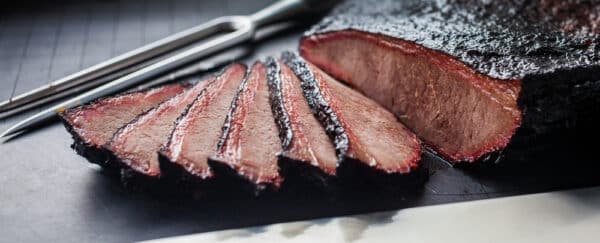
Quality of beef
When choosing the best brisket for grilling, quality of beef is paramount. The texture and flavor of the meat can greatly impact the outcome of your grilling experience. Look for beef with good marbling and a healthy amount of insulating fat, known as intramuscular fat.
This helps keep the meat moist and adds rich flavor to your brisket.
Moving on to “Pricing” considerations.
Pricing
Considering the quality of beef you prefer is crucial when deciding on grass-fed or grain-fed brisket, it’s important to recognize that pricing can vary depending on the type of beef.
Grass-fed brisket generally comes at a higher price point due to the costlier production process and lower yield compared to grain-fed beef. The organic nature and nutritional benefits also contribute to the higher pricing of grass-fed options, making them an ideal choice for those valuing sustainability and health benefits.
On the other hand, grain-fed brisket tends to be more affordable since it is mass-produced with higher yields. Understanding these differences in pricing can help you make an informed decision based on your budget and preferences.
Supporting local farmers
When it comes to choosing the best brisket for grilling, supporting local farmers is a significant consideration. By purchasing grass-fed or grain-fed beef from local farms, we contribute to the sustainability of our communities and help small-scale farmers thrive.
Buying locally also ensures fresher meat with fewer additives, supporting ethical farming practices and minimizing environmental impact. Building relationships with local farmers allows us to gain insight into their processes, ensuring that we are making informed choices about the food we prepare and consume.
More Reading: Learn how to use brisket spritz for max flavor.
Conclusion
When choosing between grass-fed and grain-fed brisket for grilling, it’s essential to consider the differences in flavor, texture, and nutritional content. Understanding the pros and cons of each type of beef can help make an informed decision that aligns with personal preferences.
Whether opting for leaner grass-fed brisket or favoring the tenderness of grain-fed brisket, both options offer unique qualities to enhance your grilling experience. Ultimately, selecting the best brisket for grilling comes down to individual taste preferences and desired health benefits.
Making a conscious choice based on these factors can lead to a gratifying grilling experience while supporting local farmers and sustainable farming practices.
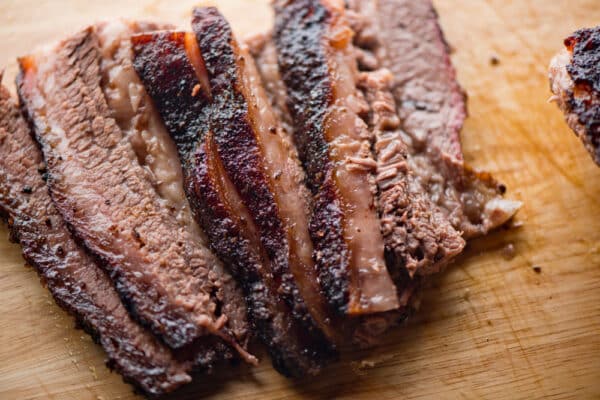
FAQs
1. What is the difference between grass-fed and grain-fed brisket?
Grass-fed brisket comes from cattle that primarily graze on pasture, while grain-fed brisket comes from cattle raised with a diet mainly consisting of grains.
2. Which type of brisket is best for grilling?
Both grass-fed and grain-fed briskets can be grilled, but some prefer the richer flavor of grass-fed, while others enjoy the marbling and tenderness of grain-fed.
3. Does cooking method differ for grass-fed and grain-fed briskets?
The cooking method can vary slightly based on the type of beef due to differences in fat content. However, both types can be prepared using similar grilling techniques.
4. Are there nutritional differences between grass- fed and grain- fed briskets?
Yes, there are nutritional variations as grass-fed beef tends to have higher levels of omega-3 fatty acids and antioxidants compared to grain-fed beef.
5. How does the environment impact my choice between grass-finished or grain-finished brisket?
Choosing between grass or grain-finished may involve considering factors such as sustainability practices, animal welfare, environmental impact, taste preference, and personal health considerations.
Learn More About Grilling
If you want to learn more about grilling, check out these other helpful resources!

Kevin Turner
Hi there, I'm Kevin Turner, Founder and CEO of thegrillingmaster.com. I started this website to share my passion and knowledge with you. You can leverage my years of experience as a pit master and professional to grill great food!
About The Grilling Master
Hi there, I'm Kevin Turner, Founder and CEO of thegrillingmaster.com.
My passion has always been grilling, smoking and BBQ delicious meats that satisfy my inner carnivore!
I started this website to share my passion and knowledge with you, the hungry reader who wants to prepare the perfect meal.
You can leverage my years of experience as a pit master and professional.
Send me a message and let's connect on Twitter here.



